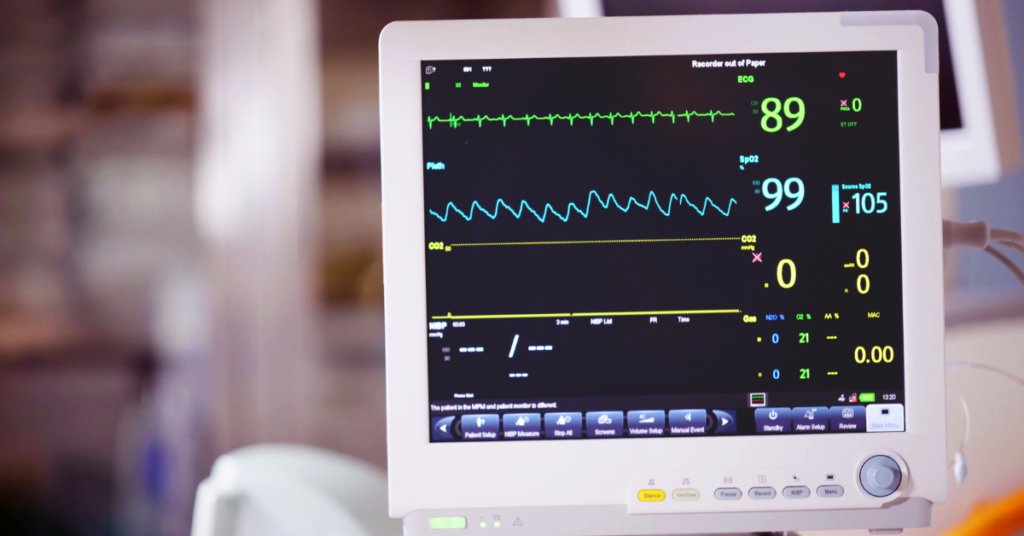
Imagine sitting in a doctor’s office, holding an ECG report in your hands. Your eyes stop at a phrase that sounds unfamiliar—“low voltage on ECG.” Your heart starts to race, not because of a medical issue, but because of the fear that follows those words. What does it even mean? Is something wrong with your heart? Should you be worried?
If you’ve found yourself in this moment, please know—you’re not alone. Many people feel the same confusion and anxiety when they see something unexpected on their heart test. Low voltage on ECG sounds serious, and sometimes it can be, but not always. In many cases, it’s just a clue your body is trying to give you—not a final answer.
In this article, we’ll walk through what low voltage on ECG actually means, why it shows up, when it might be a cause for concern, and most importantly—what you can do next. You don’t need to feel scared or lost. By the end, you’ll feel more confident, more informed, and better prepared to talk about your heart health—without fear. Let’s take this one step at a time, together.
What Is an ECG and What Does Voltage Mean?

A. The Basics of an ECG
Let’s start with something simple: your heart is not just a muscle—it’s also an electrical system. Every time your heart beats, it sends tiny electrical signals that tell it when to squeeze and when to relax. These signals are what keep your heart rhythm going, beat after beat.
An ECG (electrocardiogram)—also written as EKG—is a test that records these electrical signals. It’s painless, quick, and often done right in a clinic or hospital. Small patches (called electrodes) are placed on your skin—usually on your chest, arms, and legs—and they pick up the electrical activity of your heart. The ECG machine then prints it out as a graph with waves and lines.
Each little wave on that graph tells a story. It shows how fast your heart is beating, whether the rhythm is steady, and if the electrical signals are flowing the right way. It can even help detect if there’s damage in the heart muscle or if your heart is working harder than it should.
Now, let’s talk about the word “voltage.” In simple terms, voltage is the strength or size of those electrical signals. Think of it like the volume on a speaker—how loud or quiet it is. In an ECG, the voltage shows how strong your heart’s electrical activity is.
When everything is working well, the ECG shows normal waves with a healthy level of voltage. But sometimes, the waves are smaller than usual—and that’s when the term “low voltage on ECG” comes up.
B. Understanding “Low Voltage”
Hearing or reading “low voltage on ECG” can feel alarming. But let’s take a deep breath and understand what it actually means.
Low voltage means that the electrical signals your heart is producing are weaker than expected. In the ECG graph, this shows up as smaller-than-normal waves. It’s not always a sign of something serious—but it is something that needs to be understood properly.
Now, let’s look at how this is measured. Doctors check voltage levels in two main areas of the ECG:
- Limb leads (which record signals from the arms and legs)
- Chest leads (which record signals from the front of your chest)
Here’s what’s considered low voltage in simple terms:
- In limb leads: If the wave height is less than 5 mm (millimeters), it’s considered low.
- In chest leads: If the wave height is less than 10 mm, it’s considered low.
So when you see “low voltage on ECG” written in your report, it usually means that either or both of these sets of leads are showing signals that are smaller than the normal range.
But remember this—an ECG doesn’t give final answers by itself. It’s just the beginning of a conversation about your heart. There are many reasons why low voltage might show up, and not all of them are related to heart disease. Sometimes it’s something as simple as the way the test was done, or other health conditions that aren’t even related to your heart.
So if you’ve seen this term on your report, don’t panic. It doesn’t mean something is terribly wrong. Instead, it’s a clue. A gentle nudge to take a closer look—and we’ll explore more about those causes in the next sections.
Let’s keep going. You’re doing great—and understanding your heart better is one of the most powerful things you can do for yourself.
Common Causes of Low Voltage on ECG

Seeing the phrase “low voltage on ECG” can feel scary, especially when you’re not sure what it means. But here’s something important to remember: low voltage is not always caused by a heart disease. Sometimes it’s just the way your body is built, or even a small technical issue during the test. Think of it as your body whispering something, not screaming. Let’s gently break down the common causes so you can understand what might be going on—without panic, just clarity.
1. Non-Cardiac Causes
Not all causes of low voltage are heart-related. In fact, many times, it has more to do with things happening outside the heart. Here are some common non-cardiac reasons:
- Obesity or Thick Chest Wall: When there’s more fat tissue or muscle between the ECG electrodes and your heart—like in cases of obesity or a naturally thick chest wall—the electrical signals have a harder time traveling through. This can make the ECG waves look smaller, even if your heart is working just fine.
- Chronic Lung Disease (like COPD): People with long-term lung conditions—such as Chronic Obstructive Pulmonary Disease (COPD)—often show low voltage on ECG. The lungs become overinflated with air, which can push the heart backward and make the signals weaker by the time they reach the skin.
- Hypothyroidism (Low Thyroid Hormone Levels): Your thyroid controls many things in your body, including metabolism and energy levels. When it’s underactive, it can lead to low voltage. The heart may beat slower and weaker, and fluid can build up around tissues—both of which can affect the ECG reading.
- Pericardial Effusion (Fluid Around the Heart): This is when fluid collects in the sac that surrounds your heart. The fluid acts like a cushion, blocking some of the heart’s electrical activity from reaching the ECG electrodes. As a result, the waves appear smaller.
2. Cardiac-Related Causes
Sometimes, low voltage on ECG does come from something more directly related to the heart itself. Let’s look at a few possibilities:
- Cardiomyopathy (Weakened Heart Muscle): This condition causes the heart muscle to become weak or stretched, reducing its ability to pump effectively. As a result, the electrical signals it produces may also become weaker, showing up as low voltage on the ECG.
- Myocardial Infarction (Heart Attack Damage): When someone has had a heart attack, parts of the heart muscle may become damaged or die. This can reduce the strength of the heart’s electrical signals, leading to smaller waves on the ECG.
- Cardiac Amyloidosis or Sarcoidosis: These are rare conditions where abnormal proteins or immune cells build up in the heart. Over time, this buildup stiffens the heart and interferes with its normal function, including its electrical activity.
- Constrictive Pericarditis: This is a condition where the sac around the heart becomes stiff and scarred. It can limit the heart’s ability to move freely and also reduce the electrical signals, again leading to low voltage on ECG.
3. External or Technical Factors
Now here’s something that might surprise you—sometimes low voltage has nothing to do with your health at all. It can just be a result of how the ECG was performed. These technical issues are more common than you might think:
- Poor Lead Placement: If the electrodes (sticky patches) aren’t placed correctly, the machine may not capture your heart’s signals accurately. This can make the waves appear smaller even if your heart is perfectly fine.
- Low-Quality ECG Machine or Noise Interference: Not all machines are created equal. Older machines, or those used in noisy environments (with electrical interference), might give a reading that shows low voltage—even though it doesn’t reflect your real heart condition.
- Skin-Electrode Resistance: If the skin is dry, hairy, or if the electrodes didn’t stick well, the signals may not be picked up properly. Again, this can falsely show low voltage on ECG when there’s nothing wrong with your heart at all.
Is Low Voltage on ECG Dangerous?

Let’s be honest—reading the words “low voltage on ECG” can feel like a punch in the gut. It sounds technical, serious, and maybe even dangerous. But here’s the truth: low voltage doesn’t always mean something is wrong with your heart. Sometimes, it’s nothing to worry about. Other times, it’s your body’s gentle way of saying, “Hey, let’s look a little deeper.” So, take a deep breath—we’re going to talk about when low voltage is harmless and when it might need more attention.
A. When Low Voltage Is Harmless
Believe it or not, low voltage on ECG is often found in people who are completely healthy. In many cases, it can be linked to body structure or non-cardiac conditions like obesity, thick chest walls, or even a common cold affecting the lungs. It might also show up due to simple things like poor electrode placement or minor technical issues with the ECG machine.
Here’s what that means for you: if you’re feeling fine—no chest pain, no breathlessness, no swelling—low voltage might just be a normal abnormality. Your doctor may simply make a note of it and move on, especially if everything else looks good.
B. When to Be Concerned: Red Flags to Watch For
Now, let’s talk about when low voltage on ECG could be more than just a harmless finding. It’s not about the ECG alone—it’s about what else is happening in your body. If you’re experiencing certain symptoms along with low voltage, that’s when your doctor might start asking more questions.
Here are a few red flags that may require closer attention:
- Shortness of Breath – If you get tired quickly doing simple things like climbing stairs or walking short distances, it could be a sign your heart isn’t pumping as well as it should.
- Swelling in Legs or Feet – This could be due to fluid buildup, possibly linked to heart failure or pericardial effusion (fluid around the heart), which can cause low voltage on ECG.
- Constant Fatigue or Weakness – If you’re feeling drained all the time—physically and emotionally—it might be your body’s way of signaling that your heart needs support.
- Chest Pain or Irregular Heartbeats – These are always important to mention. Even if your ECG says low voltage, what matters more is how you feel.
Remember, your symptoms tell a much bigger story than just numbers on a report.
C. Why It’s Important to Look at the Full Picture
Here’s something that brings peace of mind: doctors never diagnose based on one ECG alone. Think of ECG like a snapshot—it captures just one moment in time. That’s why healthcare professionals look at other things too, like:
- Your symptoms
- Medical history
- Physical examination
- Other tests (like echocardiogram, blood tests, chest X-ray, or even advanced scans)
So even if you’ve been told you have low voltage on ECG, it doesn’t mean something is definitely wrong. It just means your care team wants to understand why—and that’s a good thing.
D. How Doctors Interpret ECG Holistically
When doctors read an ECG, they don’t just look at one part. They look at the full story your heart is telling—wave patterns, timing, rhythm, and voltage. Even if the voltage looks low, they ask:
- Is this new or has it been there before?
- Are there signs of heart muscle damage?
- Are there other clues pointing to a heart condition?
They also compare it to past ECGs (if you’ve had them) and combine that information with your physical signs and lab results. That’s how they separate what’s normal for you from what needs attention.
Diagnosis & What Happens Next

Hearing the words “low voltage on ECG” can leave you with so many questions: What does this really mean? What should I do now? Take a deep breath. The good news is, you don’t have to face this alone—and it’s not something that always needs immediate treatment. In fact, this finding is often just a clue that helps guide your doctor toward the next steps in understanding your overall health.
Let’s walk through what usually happens after a low voltage ECG result—and how you can take control of your heart health with the right support.
A. What Your Doctor May Recommend
Once low voltage on ECG is spotted, your doctor’s goal is to figure out why it’s showing up. Remember, it’s not the final answer—it’s just the beginning of a deeper look into your health. Depending on your symptoms and history, you may be asked to go for some additional tests.
Here are some common next steps your doctor may suggest:
- Echocardiogram (ECHO) – This is an ultrasound of your heart. It shows how well your heart is pumping, and can detect issues like pericardial effusion (fluid around the heart), which often causes low voltage.
- Cardiac MRI or CT Scan – These give a very detailed look at the heart’s structure, helping your care team spot any underlying problems like scarring or inflammation.
- Chest X-Ray – A quick and simple way to check for lung issues or an enlarged heart, both of which can be linked to low voltage on ECG.
- Thyroid Function Tests – A low-performing thyroid (hypothyroidism) is a sneaky cause of low voltage and is easy to treat once diagnosed.
- Blood Tests – These help look for infections, inflammation, or other silent issues that may not show up on the ECG alone.
All of these tests help your care team piece together the bigger picture. You’re not just a heart tracing—you’re a whole person, and these tools help them understand what your body is really saying.
B. The Role of Home ECG Monitoring
Now here’s something that can truly bring comfort, especially if you’re feeling anxious or have trouble visiting clinics: home-based ECG services.
Imagine this—you’re sitting comfortably at home, no stress, no long waiting room queues, and a trained professional comes right to your doorstep to do an ECG. It’s quick, painless, and gives results your doctor can use to track changes over time.
Services like VCare@Home are designed exactly for that. If you live in Chandigarh, Mohali, or Zirakpur, VCare@Home offers in-home ECG services—bringing hospital-grade heart checkups right to your living room. This is especially helpful for:
- Elderly patients who find travel difficult
- People recovering from surgery or illness
- Those managing chronic conditions like heart failure or COPD
- Anyone who prefers comfort and privacy
Using regular ECG monitoring at home, small changes—like developing low voltage on ECG—can be caught early. That gives you and your doctor more time to act and plan ahead.
It’s about staying ahead of problems—not waiting until they become bigger.
Managing the Underlying Causes
When you see the words “low voltage on ECG”, it’s easy to worry. But the truth is, this isn’t always about something dangerous—it’s a clue. It tells your care team that something might be affecting how your heart’s electrical signals are showing up. The next step? Finding and managing the root cause.
Let’s talk about what happens if the cause is heart-related, or if it’s something else happening in your body. Either way, you’re not stuck—you have options, support, and solutions.
A. If It’s a Heart Condition
If your low voltage on ECG is caused by a heart issue, like cardiomyopathy (a weak heart muscle), a past heart attack, or fluid around the heart, don’t panic. Many of these conditions can be managed—especially when they’re caught early.
Here’s what your treatment plan might include:
- Medications: Depending on the diagnosis, your doctor may prescribe medicines to help your heart pump better, control blood pressure, or reduce fluid buildup. These medicines often make a big difference in how you feel daily.
- Lifestyle Changes: This part is powerful. Eating heart-healthy foods, reducing salt, quitting smoking, and getting gentle exercise can truly change the course of your heart health. It’s about small, steady steps—nothing extreme.
- Surgery or Procedures (If Needed): Sometimes, a minor procedure might be recommended to remove fluid around the heart or fix a damaged valve. But this depends on your individual situation. Your care team will walk you through every option with compassion and clarity.
- Regular Monitoring: When the heart’s involved, ongoing checkups matter. Repeat ECGs, echocardiograms, and follow-up visits make sure your treatment is working—and catch any changes early.
Remember: Low voltage on ECG doesn’t define you. It’s just a signal your heart needs a little extra care.
B. If It’s a Non-Cardiac Condition
Surprisingly, sometimes the heart isn’t the problem at all. Many people with low voltage on ECG actually have non-cardiac conditions that can be easily treated.
Let’s break it down:
- 🧠 Hypothyroidism: A low-functioning thyroid can slow everything down—including the heart’s signals. If blood tests show this, treatment is usually as simple as daily medication. And once thyroid levels are balanced, the ECG readings often improve too.
- 🌬️ Lung Conditions (like COPD): Chronic lung disease can change the way ECG signals move through your chest. If this is the cause, managing your lung condition with inhalers, breathing exercises, and oxygen (if needed) can ease symptoms—and help your heart readings, too.
- ⚖️ Obesity or Thick Chest Wall: Sometimes, it’s just about the signals having a harder time reaching the skin because of extra tissue or fat. This doesn’t mean your heart is weak—it just means the reading isn’t showing up clearly. In these cases, your doctor might look at other ways to check heart health.
- 💧 Pericardial Effusion: This is when fluid builds up around the heart, and it can “mute” the electrical signals. Treatment may involve medications or draining the fluid, depending on how serious it is. Once it’s treated, the low voltage on ECG often improves.
Conclusion
Hearing the words “low voltage on ECG” can feel scary—but please remember, it doesn’t always mean something serious. It’s simply a signal. A clue. Something that needs to be explored a little further to understand what’s really going on.
If you’ve seen low voltage on ECG in your report, don’t panic. The best thing you can do is talk to your doctor, ask questions, and follow up with the recommended tests. With early care and the right support, many causes can be managed effectively.
And if you’re in Chandigarh, Mohali, or Zirakpur, you don’t even have to step out. VCare@Home offers trusted, professional ECG services at home—right at your doorstep, with comfort and compassion.
💛 Your heart health matters, but so does your peace of mind. It’s okay to feel scared—but it’s even better to feel informed.
FAQs
Q1: What does low voltage on an ECG report mean?
It means the electrical signals from your heart are weaker than usual. This could be due to body-related factors, medical conditions, or even technical issues.
Q2: Is low voltage on ECG always serious?
No, it’s not always serious. Sometimes, it’s due to obesity, equipment error, or other non-heart-related factors. However, further testing is often required.
Q3: Can low voltage ECG mean heart failure?
It can be a sign of heart failure or cardiomyopathy, but it’s not a diagnosis on its own. Your doctor will look at other symptoms and tests.
Q4: How is low voltage ECG treated?
The ECG itself isn’t treated. The cause behind the low voltage is what needs medical attention—whether that’s a thyroid issue, fluid around the heart, or something else.
Q5: Can I get an ECG done at home?
Yes! Services like VCare@Home offer professional ECG testing right at your doorstep in cities like Chandigarh, Mohali, and Zirakpur.
Q6: Should I worry if I see low voltage on my report?
Don’t panic. Schedule a follow-up with your doctor. It might be minor—or it might need more attention. Either way, you’re taking the right step by learning more.
Check Out Our New Blogs!
[{"id":3421,"link":"https:\/\/vcareathome.com\/blogs\/blood-test-at-home-for-elderly","name":"blood-test-at-home-for-elderly","thumbnail":{"url":"https:\/\/vcareathome.com\/wp-content\/uploads\/2026\/02\/Blood-Test-at-Home-Reducing-Stress-for-Elderly-Patients-scaled.webp","alt":"Blood-Test-at-Home-Reducing-Stress-for-Elderly-Patients-scaled"},"title":"Blood Test at Home: Reducing Stress for Elderly Patients","postMeta":[],"author":{"name":"Admin","link":"https:\/\/vcareathome.com\/blogs\/author\/admin"},"date":"Feb 19, 2026","dateGMT":"2026-02-19 19:41:14","modifiedDate":"2026-02-19 19:42:07","modifiedDateGMT":"2026-02-19 19:42:07","commentCount":"0","commentStatus":"closed","categories":{"coma":"<a href=\"https:\/\/vcareathome.com\/blogs\/category\/blood-test-at-home\" rel=\"category tag\">Blood Test at Home<\/a>","space":"<a href=\"https:\/\/vcareathome.com\/blogs\/category\/blood-test-at-home\" rel=\"category tag\">Blood Test at Home<\/a>"},"taxonomies":{"post_tag":"<a href='https:\/\/vcareathome.com\/blogs\/tag\/blood-test-at-home' rel='post_tag'>Blood Test at Home<\/a>"},"readTime":{"min":11,"sec":14},"status":"publish","excerpt":""},{"id":3377,"link":"https:\/\/vcareathome.com\/blogs\/assisted-care-at-home","name":"assisted-care-at-home","thumbnail":{"url":"https:\/\/vcareathome.com\/wp-content\/uploads\/2026\/01\/10Signs-Its-Time-to-Consider-Assisted-Living-for-Your-Loved-One.png","alt":"10Signs It\u2019s Time to Consider Assisted Living for Your Loved One"},"title":"10 Signs It\u2019s Time to Consider Assisted Living for Your Loved One","postMeta":[],"author":{"name":"Admin","link":"https:\/\/vcareathome.com\/blogs\/author\/admin"},"date":"Jan 28, 2026","dateGMT":"2026-01-28 19:36:27","modifiedDate":"2026-01-28 19:36:28","modifiedDateGMT":"2026-01-28 19:36:28","commentCount":"0","commentStatus":"closed","categories":{"coma":"<a href=\"https:\/\/vcareathome.com\/blogs\/category\/assisted-care-at-home\" rel=\"category tag\">assisted care at home<\/a>","space":"<a href=\"https:\/\/vcareathome.com\/blogs\/category\/assisted-care-at-home\" rel=\"category tag\">assisted care at home<\/a>"},"taxonomies":{"post_tag":"<a href='https:\/\/vcareathome.com\/blogs\/tag\/assisted-care-at-home' rel='post_tag'>assisted care at home<\/a>"},"readTime":{"min":9,"sec":14},"status":"publish","excerpt":""},{"id":3371,"link":"https:\/\/vcareathome.com\/blogs\/winter-home-safety-for-elderly","name":"winter-home-safety-for-elderly","thumbnail":{"url":"https:\/\/vcareathome.com\/wp-content\/uploads\/2025\/12\/Winter-Home-Safety-for-Elderly-Complete-Checklist-Tips.png","alt":"Winter Home Safety for Elderly: Complete Checklist & Tips"},"title":"Winter Home Safety for Elderly: Complete Checklist & Tips","postMeta":[],"author":{"name":"Admin","link":"https:\/\/vcareathome.com\/blogs\/author\/admin"},"date":"Dec 29, 2025","dateGMT":"2025-12-29 18:15:34","modifiedDate":"2025-12-29 18:15:34","modifiedDateGMT":"2025-12-29 18:15:34","commentCount":"0","commentStatus":"closed","categories":{"coma":"<a href=\"https:\/\/vcareathome.com\/blogs\/category\/uncategorized\" rel=\"category tag\">Uncategorized<\/a>","space":"<a href=\"https:\/\/vcareathome.com\/blogs\/category\/uncategorized\" rel=\"category tag\">Uncategorized<\/a>"},"taxonomies":{"post_tag":"<a href='https:\/\/vcareathome.com\/blogs\/tag\/elderly-winter-safety-tips' rel='post_tag'>Elderly Winter Safety Tips<\/a><a href='https:\/\/vcareathome.com\/blogs\/tag\/winter-home-safety-for-elderly' rel='post_tag'>winter home safety for elderly<\/a>"},"readTime":{"min":11,"sec":45},"status":"publish","excerpt":""},{"id":3359,"link":"https:\/\/vcareathome.com\/blogs\/christmas-gift-ideas-2025","name":"christmas-gift-ideas-2025","thumbnail":{"url":"https:\/\/vcareathome.com\/wp-content\/uploads\/2025\/12\/Christmas-Gift-Ideas-2025-1.png","alt":"Christmas Gift Ideas 2025"},"title":"Christmas Gift Ideas 2025: Unique & Thoughtful Picks for Everyone","postMeta":[],"author":{"name":"Admin","link":"https:\/\/vcareathome.com\/blogs\/author\/admin"},"date":"Dec 17, 2025","dateGMT":"2025-12-17 08:14:40","modifiedDate":"2025-12-17 15:02:07","modifiedDateGMT":"2025-12-17 15:02:07","commentCount":"0","commentStatus":"closed","categories":{"coma":"<a href=\"https:\/\/vcareathome.com\/blogs\/category\/christmas-gift-ideas\" rel=\"category tag\">Christmas Gift Ideas<\/a>","space":"<a href=\"https:\/\/vcareathome.com\/blogs\/category\/christmas-gift-ideas\" rel=\"category tag\">Christmas Gift Ideas<\/a>"},"taxonomies":{"post_tag":"<a href='https:\/\/vcareathome.com\/blogs\/tag\/christmas-gift-ideas' rel='post_tag'>Christmas Gift Ideas<\/a>"},"readTime":{"min":14,"sec":9},"status":"publish","excerpt":""},{"id":3339,"link":"https:\/\/vcareathome.com\/blogs\/bedridden-patient-care-guide","name":"bedridden-patient-care-guide","thumbnail":{"url":"https:\/\/vcareathome.com\/wp-content\/uploads\/2025\/12\/Bedridden-Patient-Care-Complete-Guide-for-Safe-Home-Support.png","alt":"Bedridden Patient Care: Complete Guide for Safe Home Support"},"title":"Bedridden Patient Care: Complete Guide for Safe Home Support","postMeta":[],"author":{"name":"Admin","link":"https:\/\/vcareathome.com\/blogs\/author\/admin"},"date":"Dec 11, 2025","dateGMT":"2025-12-11 19:03:25","modifiedDate":"2025-12-11 19:03:26","modifiedDateGMT":"2025-12-11 19:03:26","commentCount":"0","commentStatus":"closed","categories":{"coma":"<a href=\"https:\/\/vcareathome.com\/blogs\/category\/bedridden-patient-care\" rel=\"category tag\">Bedridden Patient Care<\/a>","space":"<a href=\"https:\/\/vcareathome.com\/blogs\/category\/bedridden-patient-care\" rel=\"category tag\">Bedridden Patient Care<\/a>"},"taxonomies":{"post_tag":"<a href='https:\/\/vcareathome.com\/blogs\/tag\/bedridden-patient-care' rel='post_tag'>Bedridden Patient Care<\/a>"},"readTime":{"min":19,"sec":0},"status":"publish","excerpt":""},{"id":3331,"link":"https:\/\/vcareathome.com\/blogs\/fall-prevention-tips-seniors","name":"fall-prevention-tips-seniors","thumbnail":{"url":"https:\/\/vcareathome.com\/wp-content\/uploads\/2025\/12\/Fall-Prevention-Tips-for-Seniors-to-Stay-Safe-at-Home-1-scaled.jpg","alt":"Fall Prevention Tips for Seniors to Stay Safe at Home"},"title":"Fall Prevention Tips for Seniors to Stay Safe at Home","postMeta":[],"author":{"name":"Admin","link":"https:\/\/vcareathome.com\/blogs\/author\/admin"},"date":"Dec 4, 2025","dateGMT":"2025-12-04 18:21:55","modifiedDate":"2025-12-04 18:31:17","modifiedDateGMT":"2025-12-04 18:31:17","commentCount":"0","commentStatus":"closed","categories":{"coma":"<a href=\"https:\/\/vcareathome.com\/blogs\/category\/uncategorized\" rel=\"category tag\">Uncategorized<\/a>","space":"<a href=\"https:\/\/vcareathome.com\/blogs\/category\/uncategorized\" rel=\"category tag\">Uncategorized<\/a>"},"taxonomies":{"post_tag":""},"readTime":{"min":14,"sec":42},"status":"publish","excerpt":""},{"id":3321,"link":"https:\/\/vcareathome.com\/blogs\/7-early-warning-signs-of-diabetes-you-shouldnt-ignore","name":"7-early-warning-signs-of-diabetes-you-shouldnt-ignore","thumbnail":{"url":"https:\/\/vcareathome.com\/wp-content\/uploads\/2025\/10\/7-Early-Warning-Signs-of-Diabetes-You-Shouldnt-Ignore.png","alt":"7 Early Warning Signs of Diabetes You Shouldn\u2019t Ignore"},"title":"7 Early Warning Signs of Diabetes You Shouldn\u2019t Ignore","postMeta":[],"author":{"name":"Admin","link":"https:\/\/vcareathome.com\/blogs\/author\/admin"},"date":"Nov 17, 2025","dateGMT":"2025-11-17 05:32:16","modifiedDate":"2025-11-17 06:14:25","modifiedDateGMT":"2025-11-17 06:14:25","commentCount":"0","commentStatus":"closed","categories":{"coma":"<a href=\"https:\/\/vcareathome.com\/blogs\/category\/signs-of-diabetes\" rel=\"category tag\">Signs of Diabetes<\/a>","space":"<a href=\"https:\/\/vcareathome.com\/blogs\/category\/signs-of-diabetes\" rel=\"category tag\">Signs of Diabetes<\/a>"},"taxonomies":{"post_tag":"<a href='https:\/\/vcareathome.com\/blogs\/tag\/signs-of-diabetes' rel='post_tag'>Signs of Diabetes<\/a>"},"readTime":{"min":11,"sec":40},"status":"publish","excerpt":""},{"id":3073,"link":"https:\/\/vcareathome.com\/blogs\/iv-injections-uses-types-equipment-side-effects","name":"iv-injections-uses-types-equipment-side-effects","thumbnail":{"url":"https:\/\/vcareathome.com\/wp-content\/uploads\/2025\/09\/Uses-Equipment-Sites-Types-and-Side-Effects.png","alt":"Uses, Equipment, Sites, Types, and Side Effects"},"title":"IV Injections: Uses, Equipment, Sites, Types, and Side Effects","postMeta":[],"author":{"name":"Admin","link":"https:\/\/vcareathome.com\/blogs\/author\/admin"},"date":"Sep 26, 2025","dateGMT":"2025-09-26 08:01:54","modifiedDate":"2025-10-13 04:03:23","modifiedDateGMT":"2025-10-13 04:03:23","commentCount":"0","commentStatus":"closed","categories":{"coma":"<a href=\"https:\/\/vcareathome.com\/blogs\/category\/iv-injections\" rel=\"category tag\">IV Injections<\/a>","space":"<a href=\"https:\/\/vcareathome.com\/blogs\/category\/iv-injections\" rel=\"category tag\">IV Injections<\/a>"},"taxonomies":{"post_tag":"<a href='https:\/\/vcareathome.com\/blogs\/tag\/iv-injections' rel='post_tag'>IV Injections<\/a>"},"readTime":{"min":15,"sec":21},"status":"publish","excerpt":""},{"id":3048,"link":"https:\/\/vcareathome.com\/blogs\/alzheimers-disease-symptoms-causes-stages-treatment","name":"alzheimers-disease-symptoms-causes-stages-treatment","thumbnail":{"url":"https:\/\/vcareathome.com\/wp-content\/uploads\/2025\/09\/Alzheimers-Disease-Symptoms-Causes-Stages-Treatment-scaled.jpg","alt":"Alzheimer\u2019s Disease: Symptoms, Causes, Stages & Treatment"},"title":"Alzheimer\u2019s Disease: Symptoms, Causes, Stages & Treatment","postMeta":[],"author":{"name":"Admin","link":"https:\/\/vcareathome.com\/blogs\/author\/admin"},"date":"Sep 19, 2025","dateGMT":"2025-09-19 04:10:38","modifiedDate":"2025-09-19 04:10:39","modifiedDateGMT":"2025-09-19 04:10:39","commentCount":"0","commentStatus":"closed","categories":{"coma":"<a href=\"https:\/\/vcareathome.com\/blogs\/category\/alzheimers-disease\" rel=\"category tag\">Alzheimer\u2019s Disease<\/a>","space":"<a href=\"https:\/\/vcareathome.com\/blogs\/category\/alzheimers-disease\" rel=\"category tag\">Alzheimer\u2019s Disease<\/a>"},"taxonomies":{"post_tag":"<a href='https:\/\/vcareathome.com\/blogs\/tag\/alzheimers-disease' rel='post_tag'>Alzheimer\u2019s Disease<\/a>"},"readTime":{"min":17,"sec":52},"status":"publish","excerpt":""},{"id":3038,"link":"https:\/\/vcareathome.com\/blogs\/clean-tracheostomy-tube-home-care","name":"clean-tracheostomy-tube-home-care","thumbnail":{"url":"https:\/\/vcareathome.com\/wp-content\/uploads\/2025\/09\/How-to-Clean-a-Tracheostomy-Tube-at-Home-Easy-Care-Guide.png","alt":"How to Clean a Tracheostomy Tube at Home Easy Care Guide"},"title":"How to Clean a Tracheostomy Tube at Home | Easy Care Guide","postMeta":[],"author":{"name":"Admin","link":"https:\/\/vcareathome.com\/blogs\/author\/admin"},"date":"Sep 11, 2025","dateGMT":"2025-09-11 10:14:29","modifiedDate":"2025-09-11 10:14:29","modifiedDateGMT":"2025-09-11 10:14:29","commentCount":"0","commentStatus":"closed","categories":{"coma":"<a href=\"https:\/\/vcareathome.com\/blogs\/category\/tracheostomy-care\" rel=\"category tag\">tracheostomy care<\/a>","space":"<a href=\"https:\/\/vcareathome.com\/blogs\/category\/tracheostomy-care\" rel=\"category tag\">tracheostomy care<\/a>"},"taxonomies":{"post_tag":"<a href='https:\/\/vcareathome.com\/blogs\/tag\/cleaning-tracheostomy-tube' rel='post_tag'>cleaning Tracheostomy Tube<\/a>"},"readTime":{"min":17,"sec":18},"status":"publish","excerpt":""},{"id":3010,"link":"https:\/\/vcareathome.com\/blogs\/home-wound-care-hacks-beat-infection","name":"home-wound-care-hacks-beat-infection","thumbnail":{"url":"https:\/\/vcareathome.com\/wp-content\/uploads\/2025\/09\/Home-Wound-Care-Hacks-Keep-Infections-Away-and-Heal-Faster-scaled.jpg","alt":"Home Wound Care Hacks Keep Infections Away and Heal Faster!"},"title":"Home Wound Care Hacks: Keep Infections Away and Heal Faster!","postMeta":[],"author":{"name":"Admin","link":"https:\/\/vcareathome.com\/blogs\/author\/admin"},"date":"Sep 3, 2025","dateGMT":"2025-09-03 12:03:22","modifiedDate":"2025-09-03 12:03:22","modifiedDateGMT":"2025-09-03 12:03:22","commentCount":"0","commentStatus":"closed","categories":{"coma":"<a href=\"https:\/\/vcareathome.com\/blogs\/category\/wound\" rel=\"category tag\">wound<\/a>, <a href=\"https:\/\/vcareathome.com\/blogs\/category\/wound\/wound-infection-wound\" rel=\"category tag\">wound infection<\/a>","space":"<a href=\"https:\/\/vcareathome.com\/blogs\/category\/wound\" rel=\"category tag\">wound<\/a> <a href=\"https:\/\/vcareathome.com\/blogs\/category\/wound\/wound-infection-wound\" rel=\"category tag\">wound infection<\/a>"},"taxonomies":{"post_tag":"<a href='https:\/\/vcareathome.com\/blogs\/tag\/wound-infection' rel='post_tag'>wound infection<\/a>"},"readTime":{"min":20,"sec":19},"status":"publish","excerpt":""},{"id":2927,"link":"https:\/\/vcareathome.com\/blogs\/dementia-ki-poori-jankari-lakshan-karan-nidan-ilaj","name":"dementia-ki-poori-jankari-lakshan-karan-nidan-ilaj","thumbnail":{"url":"https:\/\/vcareathome.com\/wp-content\/uploads\/2025\/08\/Dementia-\u0915\u0940-\u092a\u0942\u0930\u0940-\u091c\u093e\u0928\u0915\u093e\u0930\u0940-\u0932\u0915\u094d\u0937\u0923-\u0915\u093e\u0930\u0923-\u0928\u093f\u0926\u093e\u0928-\u0907\u0932\u093e\u091c-\u0914\u0930-\u0918\u0930-\u092a\u0930-\u0926\u0947\u0916\u092d\u093e\u0932.png","alt":"Dementia \u0915\u0940 \u092a\u0942\u0930\u0940 \u091c\u093e\u0928\u0915\u093e\u0930\u0940 \u0932\u0915\u094d\u0937\u0923, \u0915\u093e\u0930\u0923, \u0928\u093f\u0926\u093e\u0928, \u0907\u0932\u093e\u091c \u0914\u0930 \u0918\u0930 \u092a\u0930 \u0926\u0947\u0916\u092d\u093e\u0932"},"title":"Dementia \u0915\u0940 \u092a\u0942\u0930\u0940 \u091c\u093e\u0928\u0915\u093e\u0930\u0940: \u0932\u0915\u094d\u0937\u0923, \u0915\u093e\u0930\u0923, \u0907\u0932\u093e\u091c \u0914\u0930 \u0918\u0930 \u092a\u0930 \u0926\u0947\u0916\u092d\u093e\u0932","postMeta":[],"author":{"name":"Admin","link":"https:\/\/vcareathome.com\/blogs\/author\/admin"},"date":"Aug 22, 2025","dateGMT":"2025-08-22 10:49:19","modifiedDate":"2025-08-22 10:49:19","modifiedDateGMT":"2025-08-22 10:49:19","commentCount":"0","commentStatus":"closed","categories":{"coma":"<a href=\"https:\/\/vcareathome.com\/blogs\/category\/dementia\" rel=\"category tag\">Dementia<\/a>","space":"<a href=\"https:\/\/vcareathome.com\/blogs\/category\/dementia\" rel=\"category tag\">Dementia<\/a>"},"taxonomies":{"post_tag":"<a href='https:\/\/vcareathome.com\/blogs\/tag\/dementia-%e0%a4%95%e0%a5%80-%e0%a4%aa%e0%a5%82%e0%a4%b0%e0%a5%80-%e0%a4%9c%e0%a4%be%e0%a4%a8%e0%a4%95%e0%a4%be%e0%a4%b0%e0%a5%80' rel='post_tag'>Dementia \u0915\u0940 \u092a\u0942\u0930\u0940 \u091c\u093e\u0928\u0915\u093e\u0930\u0940<\/a>"},"readTime":{"min":17,"sec":8},"status":"publish","excerpt":""},{"id":2911,"link":"https:\/\/vcareathome.com\/blogs\/exercises-to-avoid-for-lower-back-pain-sciatica","name":"exercises-to-avoid-for-lower-back-pain-sciatica","thumbnail":{"url":"https:\/\/vcareathome.com\/wp-content\/uploads\/2025\/08\/5-Exercises-to-Avoid-for-Lower-Back-Pain-Sciatica.png","alt":"5 Exercises to Avoid for Lower Back Pain & Sciatica"},"title":"5 Exercises to Avoid for Lower Back Pain & Sciatica","postMeta":[],"author":{"name":"Admin","link":"https:\/\/vcareathome.com\/blogs\/author\/admin"},"date":"Aug 18, 2025","dateGMT":"2025-08-18 10:25:27","modifiedDate":"2025-10-13 04:01:13","modifiedDateGMT":"2025-10-13 04:01:13","commentCount":"0","commentStatus":"closed","categories":{"coma":"<a href=\"https:\/\/vcareathome.com\/blogs\/category\/lower-back-pain\" rel=\"category tag\">Lower Back Pain<\/a>, <a href=\"https:\/\/vcareathome.com\/blogs\/category\/sciatica\" rel=\"category tag\">Sciatica<\/a>","space":"<a href=\"https:\/\/vcareathome.com\/blogs\/category\/lower-back-pain\" rel=\"category tag\">Lower Back Pain<\/a> <a href=\"https:\/\/vcareathome.com\/blogs\/category\/sciatica\" rel=\"category tag\">Sciatica<\/a>"},"taxonomies":{"post_tag":"<a href='https:\/\/vcareathome.com\/blogs\/tag\/lower-back-pain-sciatica' rel='post_tag'>Lower Back Pain Sciatica<\/a>"},"readTime":{"min":17,"sec":48},"status":"publish","excerpt":""},{"id":2832,"link":"https:\/\/vcareathome.com\/blogs\/icu-at-home-services-mohali-and-handigarh","name":"icu-at-home-services-mohali-and-handigarh","thumbnail":{"url":"https:\/\/vcareathome.com\/wp-content\/uploads\/2025\/08\/How-to-Find-Trusted-ICU-at-Home-Services-in-Mohali-Chandigarh.png","alt":"How to Find Trusted ICU at Home Services in Mohali & Chandigarh"},"title":"How to Find Trusted ICU at Home Services in Mohali & Chandigarh","postMeta":[],"author":{"name":"Admin","link":"https:\/\/vcareathome.com\/blogs\/author\/admin"},"date":"Aug 2, 2025","dateGMT":"2025-08-02 05:26:41","modifiedDate":"2025-08-02 05:26:42","modifiedDateGMT":"2025-08-02 05:26:42","commentCount":"0","commentStatus":"closed","categories":{"coma":"<a href=\"https:\/\/vcareathome.com\/blogs\/category\/icu-at-home\" rel=\"category tag\">ICU at Home<\/a>","space":"<a href=\"https:\/\/vcareathome.com\/blogs\/category\/icu-at-home\" rel=\"category tag\">ICU at Home<\/a>"},"taxonomies":{"post_tag":"<a href='https:\/\/vcareathome.com\/blogs\/tag\/icu-at-home-services-in-mohali-chandigarh' rel='post_tag'>ICU at Home Services in Mohali & Chandigarh<\/a>"},"readTime":{"min":14,"sec":44},"status":"publish","excerpt":""},{"id":2819,"link":"https:\/\/vcareathome.com\/blogs\/socialization-for-seniors-longevity-benefits","name":"socialization-for-seniors-longevity-benefits","thumbnail":{"url":"https:\/\/vcareathome.com\/wp-content\/uploads\/2025\/07\/How-Socialization-Helps-Seniors-Live-Longer.png","alt":"How Socialization Helps Seniors Live Longer"},"title":"Socialization for Seniors: The Secret to Living Happier & Longer","postMeta":[],"author":{"name":"Admin","link":"https:\/\/vcareathome.com\/blogs\/author\/admin"},"date":"Jul 23, 2025","dateGMT":"2025-07-23 04:50:16","modifiedDate":"2025-07-23 04:50:16","modifiedDateGMT":"2025-07-23 04:50:16","commentCount":"0","commentStatus":"closed","categories":{"coma":"<a href=\"https:\/\/vcareathome.com\/blogs\/category\/socialization-for-seniors\" rel=\"category tag\">Socialization for Seniors\u200b\u200b<\/a>","space":"<a href=\"https:\/\/vcareathome.com\/blogs\/category\/socialization-for-seniors\" rel=\"category tag\">Socialization for Seniors\u200b\u200b<\/a>"},"taxonomies":{"post_tag":"<a href='https:\/\/vcareathome.com\/blogs\/tag\/socialization-for-seniors' rel='post_tag'>Socialization for Seniors\u200b\u200b<\/a>"},"readTime":{"min":16,"sec":59},"status":"publish","excerpt":""}]



























